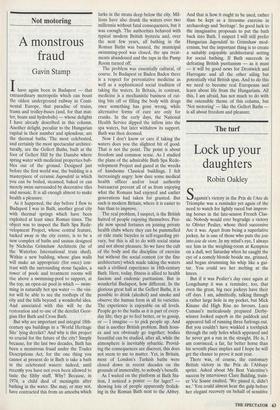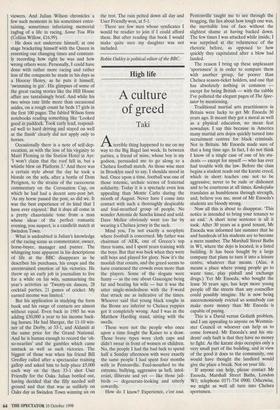The turf
Lock up your daughters
Robin Oakley
But if it was Peslier's day once again at Longchamp it was a reminder, too, that even the great, big race jockeys have their off days. I am, admittedly, talking through a rather large hole in my pocket, but Mick Kinane did High Rise no favours. Luca Cumani's meticulously prepared Derby- winner looked superb in the paddock and appeared full of running three furlongs out. But you couldn't have winkled a toothpick through the only holes which appeared and he never got a run in the straight. He is, I am convinced, a far, far better horse than his seventh place implies and I hope he will get the chance to prove it next year.
There was, of course, the customary British victory in the Prix de l'Abbaye sprint. Asked about My Best Valentine's success by interviewer Clare Balding, train- er Vic Soane exulted, 'We pissed it, didn't we.' You could almost hear the gulp before her elegant recovery on behalf of sensitive viewers. And Julian Wilson chronicles a few such moments in his sometimes enter- taining, sometimes infuriating memorial ragbag of a life in racing, Some You Win (Collins Willow, £16.99).
He does not underrate himself, at one stage bracketing himself with the Queen in resenting our changing times and constant- ly recording how right he was and how wrong others were. Personally, I could have done with rather more racing and rather less of the conquests he made in his days as a Hooray Henry, as he puts it himself, 'swimming in gin'. His glimpses of some of the great racing stories like the Hill House affair are tantalisingly brief. And while his two wives rate little more than occasional asides, on a rough count he beds 17 girls in the first 100 pages. The fabled Wilson form notebooks reading something like 'Looked good in paddock. Took early lead, respond- ed well to hard driving and stayed on well at the finish' clearly did not apply only to horses.
Occasionally there is a note of self-dep- recation, as with the loss of his virginity to Maki Fleming in the Station Hotel in Ayr: 'I won't claim that the roof fell in, but a whistle blew on Platform 3.' And there was a certain style about the day he took a blonde on the sofa, after a bottle of Dom Perignon, to the strains of the racecourse commentary on the Coronation Cup, on which he had had a decent ante-post bet. 'As my horse passed the post, so did we. It was the best experience of its kind that I have ever enjoyed.' But it does all come in a pretty chauvinistic tone from a man whose ideas of the perfect romantic evening, you suspect, is a candlelit match at Swindon Town.
What is undoubted is Julian's knowledge of the racing scene as commentator, owner, horse-buyer, manager and punter. The whingeing tone apparent in his descriptions of life at the BBC disappears as he describes his purchases, his coups and the unrestrained emotion of his victories. He threw up an early job in journalism to live for a while on his wits, summarising the year's activities as 'Twenty-six dances, 28 cocktail parties, 21 games of cricket. My earned income was limited.'
But his application in studying the form book and his range of contacts are almost without equal. Even back in 1985 he was adding £30,000 a year to his income back- ing horses. He had Shergar, the 11-10 win- ner of the Derby, at 33-1, and Aldaniti at the same price for the Grand National. And he is human enough to record the 'oh- so-nearlies' and the gambles which came unstuck as well as such victories. The biggest of those was when his friend Bill Gredley called after a spectacular training gallop and asked him to help place £5,000 each way on the then 33-1 shot User Friendly for the Oaks. Julian bottled out, having decided that the filly needed soft ground and that that was as unlikely on Oaks day as Swindon Town winning six on the trot. The rain pelted down all day and User Friendly won, at 5-1.
There are few men whose syndicates I would be readier to join if I could afford them. But after reading this book I would make quite sure my daughter was not included.
Robin Oakley is political editor of the BBC.











































































 Previous page
Previous page